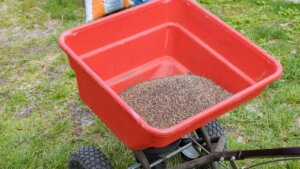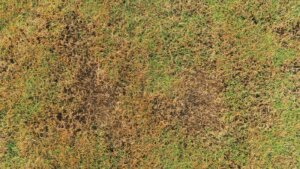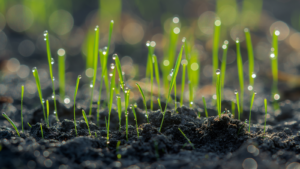Artificial Turf with Kids and Pets: A Guide
If you’re here, it’s probably because you’re considering artificial turf for your lawn. When looking to make the transition from grass to turf, a lot of questions pop up, especially if you have pets, kids, or spend a lot of time in your yard. Is artificial turf safe for pets? Will it hurt my kids’ feet or pets’ paws? What happens if they eat it? Don’t worry – we’ve got the answers for you.
If you’re tired of your pets digging great big holes in your lawn and coming in the house with muddy paws and noses, artificial turf might be a good choice for you. However, artificial turf isn’t the best choice for every home or every family – it’s important to research artificial turf pros and cons and make a choice that works for you.
Pros and Cons of Artificial Turf
Artificial turf, also known as artificial grass or synthetic grass, is manufactured using synthetic fibers and stitched together onto a backing material to keep all of the blades in place. The blades themselves can be made from nylon, polypropylene or polyethylene. Artificial turf was originally popular for sports fields and golf greens, but it’s growing in popularity for more residential homes and small businesses. Here are a few reasons why more homeowners are considering artificial turf for their lawns:
Benefits of Artificial Turf
- Nearly maintenance free: Artificial turf does not require seeding, watering, mowing, or fertilizing. Occasionally pesky weeds can poke through the backing material of artificial turf, so some minor weeding can be required. However, compared to the maintenance required of a natural grass lawn, taking care of artificial turf is a breeze. Additionally, the average home saves over 50 gallons of water per year for every square foot of artificial turf installed!
- Attractive without effort: Natural grass lawns can be difficult to maintain and keep in great shape. In drought-prone conditions, many natural grass lawns must be left to die in an effort to conserve water. This means yellow and patchy grass around your home, decreasing curb appeal. Artificial turf lawns come in a variety of colors and textures, mimicking a healthy natural lawn without any of the effort that comes with growing a natural lawn.
- Holds up to wear and tear: With pets, kids, and a natural lawn – it’s a little bit of a recipe for disaster. While there’s some romanticization to muddy pets and muddy kids – a muddy lawn means a big mess for caretakers inside and outside. Artificial turf is incredibly dig-resistant, keeping it safe from creative kids and pets.
- Highly durable: Going along with keeping up to wear and tear, a well-maintained artificial turf lawn can last for 10 to 15 years if properly cared for.
Artificial turf can be a great choice for those who want an attractive, low-maintenance, durable lawn. However, there are other aspects to consider when choosing a lawn plan for your outdoor oasis. With artificial turf, it may be green all year long, but that comes with certain conditions. Here are some of the common disadvantages of an artificial turf lawn to help you decide if it’s the right choice for you and your home:
Cons of Artificial Turf
- A higher upfront cost: Artificial turf lawns can cost more upfront than natural grass lawns. However, money returns to the homeowner in the form of drastically reduced maintenance costs. After all, there’s no lawnmower to buy or rent, greatly decreased water reduction, no fertilizer, etc.
- Different feel from natural grass: Some types of artificial turf can have very tough fibers, giving it a poky feel on bare feet. Not all artificial turf types feel this way, so it’s important to work with an installer and to ask for samples when you can. The texture of artificial turf is especially important if you have pets, kids, or spend a lot of spare time in your lawn and prefer to be barefoot.
- Can absorb heat in the sun: Artificial turf lawns can absorb heat in the sun, which can be uncomfortable in the summer months. Wearing shoes outdoors or keeping pets and kids in shady areas is a solution to this, but it is something to consider if you spend a lot of time in the yard.
- Synthetic grass cannot be recycled: While many artificial turfs are made of recycled rubber, keeping up to 20 million tires out of landfills every year, synthetic grass itself cannot be recycled. Instead, it contributes to the environment by being durable and heavily reusable, in addition to being made from a recycled product.
Artificial Turf and Pets & Kids
When it comes to your lawn, we know that you want to make the best choice possible for your family and lifestyle. So let’s get down into the specifics of artificial turf for dogs: pros and cons.
While having pets and kids on artificial turf won’t make it any less durable or attractive, adding pets into the equation creates just a bit more maintenance.
With pets and artificial turf, it’s important that the turf be cleaned and deodorized every 2-4 weeks. Pet urine should soak through the artificial grass backing into the soil, but it will still need to be sprayed off every so often in order to keep it in the best condition.
With pets, it’s incredibly important to select the right kind of artificial turf. Some older or imported artificial turf backings may contain traces of lead, which is toxic to both people and animals. Even though artificial turf is more dig-resistant than natural grass, it will likely not stop your pet from trying to eat it, making selecting a toxin-free turf more important than ever.
Texture is another important consideration when choosing an artificial turf in a pet-friendly household. The fiber of the grass blades should not be too thick or stiff, or it may result in an uncomfortable experience, if not injury. Work with your installer to choose the best brand of artificial turf for you.
Conclusion
In the end, artificial turf can make a great choice for many families with kids and pets. Decreased allergens and messes, lower maintenance, and long-lasting artificial turf can be a life-changing switch for many homeowners. Terra Lawn Care provides many different types of artificial turf and can help you decide which product would be the best fit for your family.



